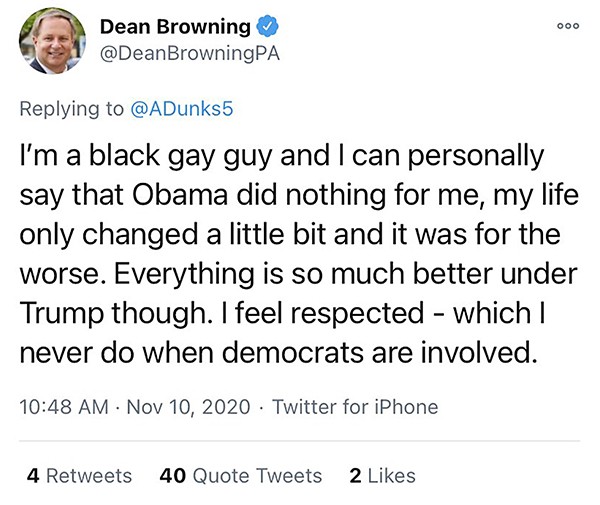By now, surely you’ve heard about Dean Browning’s Twitter slipup of last week. If you got distracted by the renewed cascade of post-election disinformation (the race was not close), sobering COVID numbers (going up), and grim statistics about economic mobility in Tennessee (it stinks), here’s a quick summary: Browning, a former commissioner in Lehigh County, Pennsylvania, tweeted some standard right-wing rhetoric about President-elect Joe Biden destroying, in four months, everything that President Trump built in four years. Then someone pointed out that many of Trump’s oft-trumpeted “wins” were actually benefits inherited from the tenure of the Obama administration. That’s when things got good.
Browning replied: “I’m a black gay guy and I can personally say that Obama did nothing for me, my life only changed a little bit and it was for the worse. Everything is so much better under Trump though. I feel respected — which I never do when Democrats are involved.”

It was Dean Browning all along!
The problem? Browning had forgotten to log out of his personal account and into his “sock puppet” account, as these accounts are called, so this very white and ostensibly straight man was caught red-handed pretending to be something he’s not. All in service of casting doubt on valid observations. It’s reality under assault.
And who could forget Memphis’ own “Bob Smith,” the Memphis Police Department’s undercover social media account? The long and short of it? There was no Bob Smith, just a low-resolution image of a Guy Fawkes mask, the most conspicuous fake name of all time, and some MPD officers presumably huddled around a computer or smartphone. The account friended more than 200 Facebook users and was used to monitor local activists and organizers. At least, it was before a judge ruled that the account was a violation of the 1978 consent decree that bars the MPD from surveilling non-criminals for political reasons.
There exists an overwhelming abundance of examples. Glenna Milberg, reporting for Local 10 in Miami, last week broke the story that some Floridian candidates in the recent election were not, in fact, real people. She wrote, “Local 10 News has found evidence to suggest three such candidates in three Florida Senate district races, two of them in Miami Dade County, were shill candidates whose presence in the races were meant to syphon votes from Democratic candidates.” There is, for example, a José Javier Rodriguez (D) and also an Alex Rodriguez (Independent) running for state senator in District 37. As Milberg writes, “In one of those races, District 37, a recount is underway because the spread between the Democratic and Republican candidates is only 31 votes. The third party candidate received more than 6,300 votes.”
Even without bringing up the specter of foreign election interference, it’s becoming increasingly clear that we have a problem. And if you still don’t believe me, try this on for size: I’m guilty, too.
Years ago, I made a bevy of faux Facebook accounts to “like,” share, and otherwise build engagement with my band’s posts. It was a free way to gin up a little buzz about a band who’d made the grotesquely huge mistake of trying to make money by playing guitar-based music in the 2010s. It wasn’t exactly an online blitz — in fact, the whole thing made up the smallest percentage of my “outreach,” but it was a tactic nonetheless.
My point here is that if a buzzed rhythm guitarist can independently execute a “sock puppet” campaign for his Yo La Tengo-wannabe band, isn’t it likely that bad actors with substantially bigger budgets can do the same? I bet half the people we’re arguing with on Twitter or Facebook or wherever aren’t even people.
Look, I’m going to be honest — I’m probably the least tech-savvy millennial alive. This week I was bested by a Google calendar. (If anyone knows how to make events show up on shared calendars and not just your personal Google calendar, feel free to email me.) But even I know we have got to find a way to fact check and regulate our online interactions, or we’re going to keep getting gamed by the least scrupulous among us.
Until then though, as a bare minimum, please at least check the date and source before sharing a story online. That is, unless it’s an invite to like my band.
Jesse Davis is the Flyer copy editor and book editor.